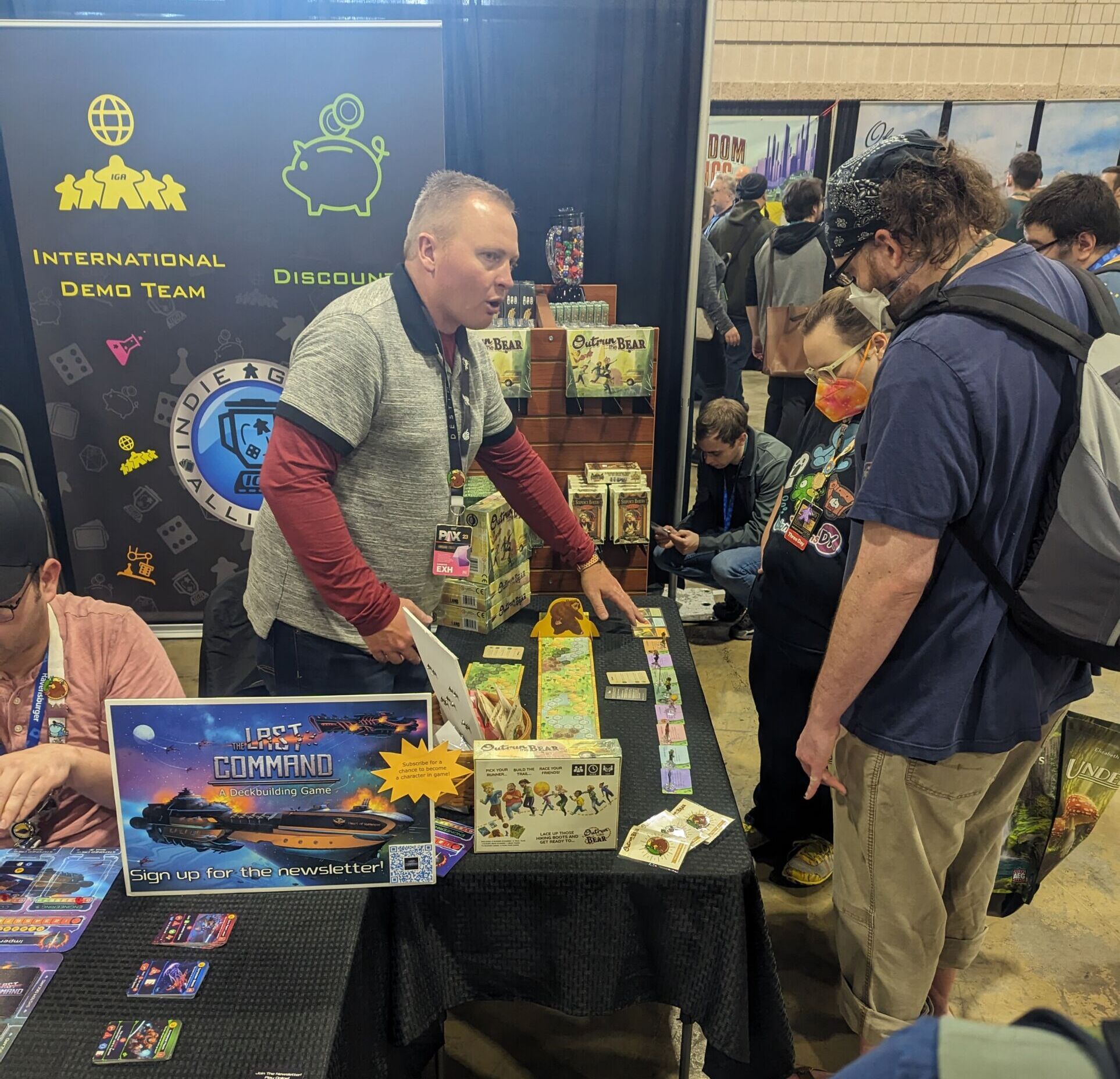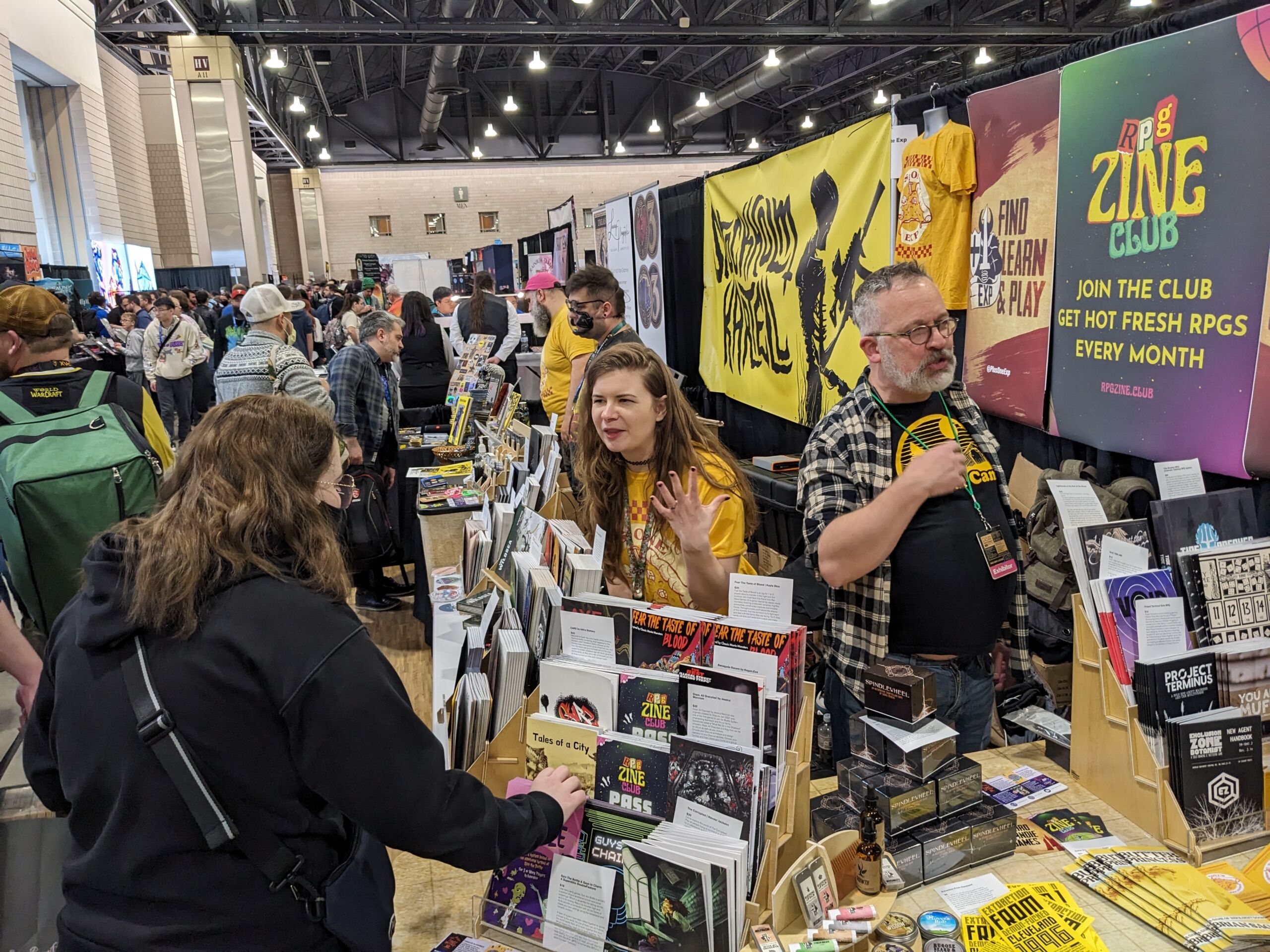Sunderfolk review: RPG magic that transports your friends together
Using your phone as a controller keeps you engaged with this accommodating RPG.
The creators of Sunderfolk wanted to make a video game that would help players “Rediscover game night.” By my reckoning, they have succeeded, because I am now regularly arguing with good friends over stupid moves. Why didn’t I pick up that gold? Don’t you see how ending up there messed up an area attack? Ah, well.
That kind of friendly friction, inside dedicated social time, only gets harder to come by as you get older, settle into routines, and sometimes move apart. I’ve hosted four Sunderfolk sessions with three friends, all in different states, and it has felt like reclaiming something I lost. Sunderfolk is a fun game with a lot of good ideas, and the best one is convincing humans to join up in pondering hex tiles, turn order, and what to name the ogres who shoot arrows (“Pointy Bros”).
Maybe you already have all the gaming appointments you need with friends, online or in person. Sunderfolk, I might suggest, is a worthy addition to your queue as a low-effort way to give everyone a break from being the organizer. It does a decent job of tutorializing and onboarding less experienced players, then adds depth as it goes on. Given that only one person out of four has to own the game on some system, and the only other hardware needed is a phone, it’s a pretty light lift for what I’m finding to be a great payoff. Some parts could be improved, but the core loop and its camaraderie engine feel sturdy.
I haven’t reached the mine cart missions yet but am glad to know they exist. Credit: Dreamhaven
Pick a class, take a seat
My party getting a well-deserved level up. From left: Boom Boom the berserker, Roguefer, Bob the mage, and Fire Bob. Credit: Kevin Purdy
Sunderfolk is a turn-based tactical RPG, putting you and your friends on a grid filled with objects, enemies, and surprises. You pick from familiar role-playing character classes—my party picked rogue, berserker, wizard, and a kind of pyromancer—and choose one ability card each turn. The cards put a Gloomhaven-like emphasis on sequence and map positioning. One of my rogue’s potential moves is a quick attack, then gaining strength by picking up nearby gold. Another involves moving, hitting, moving, hitting, then one more single-hex move at the end, to stay out of danger and get a protective “Shrouded” effect.
You and your squad are all watching the same screen, be it a living room TV, a laptop, or a window streamed over Zoom or Discord. You choose your cards, plot your movement, and interact with everything using your phone or tablet’s touchscreen. Once you’ve won a quest by beating the baddies and/or hitting other markers, you head back to town and do a whole bunch of housekeeping tasks. Sunderfolk has mechanics for both players not being present (scaling the quests and keeping the missing leveled up) and for someone having to drop mid-battle (someone else can play their seat and their own). It’s accommodating to players of different RPG experience levels and different schedules.
Sunderfolk launch date trailer.
You have my sword—and my phone
Let’s address the phone controls, the roughly 6-inch-diagonal elephant in the room. My three friends all had to spend a few minutes getting used to using their phone screen as a multi-modal controller: touchpad for hex movement and cursor pointing, card picker and info box reader, and then the town landscape screen. After that, nobody had any real issues with the controls themselves. The tactile feedback guides your finger, and there was no appreciable lag in our sessions.
Sometimes we’d get momentarily flummoxed by the card-choosing flow, and there is perhaps some inherent mental tax in switching between screens. But the phone controls, besides making couch co-op possible, also allowed everyone in my group to play in their most comfortable spot: a TV streaming the Discord app, a tablet on the couch, a laptop at the kitchen counter.
Not for nothing, but with each player using their phone for controls—and the game announcing when players had “disconnected” if they switched to another app too long, only for them to come right back—Sunderfolk can apply some anti-scrolling pressure and keep everyone checked in. You could get around this with secondary devices or tiled windows, but it’s better to be present and ask your friends whose turn it is to fire off their Ultimate card.
(To clarify how remote play works: One owner of the game can screen-cast their game to Discord, Zoom, Meet, or whatever service, everyone playing can chat there or elsewhere, and players log in their phones/controllers with a QR code that is displayed from the screen-casted main title screen)
Cheerhaven
Most times, your party will be spread out all over the town, but in this provided screenshot, everybody has remembered to upgrade their Fate cards at the Temple. Credit: Dreamhaven
All this adventuring takes place in a world of anthropomorphized animals and overgrown woods and purple-blue ogres that strongly evoke World of Warcraft’s style (at least in Act 1). When you’re back in town, you tap around to chat with recurring NPCs, gain friendship levels that sometimes result in gifts, and upgrade parts of the town to your liking. The town hub provides more opportunities for strategy and bonding with players. You might send some of the gold you greedily picked up on the last quest to the friend so they can nab a great weapon. You might, as a group, buy a quirky town upgrade just for the chance to rename some things.
But the town is one place I felt some friction, familiar from more in-depth board games. Some players will be done with making their decisions and speeding through dialogue faster than others and may or may not be more engaged with the town chatterboxes. Just as with cardboard games, you can take this moment to get up, stretch your legs, and maybe refresh a drink. But you might have to nudge people along if they’re overwhelmed by gear choices.
The non-gory, often goofy nature of Sunderfolk’s setting makes it appropriate for a wider range of players. The voice acting, almost all of it by Anjali Bhimani (i.e., Symmetra), re-creates the feel of having a game master switch between “Frightened Blue Jay miner” and “Furious Ogre Queen” in one session. I’m not too engaged in the broad plot after one act—ogres, fueled by Darkstone, want to extinguish the village’s Brightstone—but it’s not a big deal. The game has given my group something else to latch onto: naming things.
Touching the Neatos to heal Boom Boom
Michael Keaton must reach an exit hex! Credit: Kevin Purdy
The chance to name things in Sunderfolk, and have those names stick for the whole campaign, is something a good GM would do to engage their players and break up tension. Sunderfolk is clever about this, offering both secret naming prompts to individual players on their phones or dishing out naming opportunities in town. In my party’s campaign, healing statues are named Neatos, the town bridge is Seagull Murder (a misremembered, obscure Peace Bridge reference), and the beetle we rescued is named, as it was during my preview, Michael Keaton. It’s fun to build your own stupid world out of goofy names, something too few games provide.
Individual phone controls give the game a chance to pull off a few other tricks, like only telling certain players about how a certain enemy looks like they’re carrying great loot. If Sunderfolk added even more of this, I would not mind at all.
I’m generally enjoying the combat, difficulty ramp (on the default setting), and upgrade paths of the characters. After three or four sessions, your character has much more move variety, and items and weapons are more useful and varied. The town of Arden, while overly chatty, has more to offer. It feels like a game that has had its pacing and onboarding fine-tuned.
But I have nits to pick:
- There are cheap but great upgrades you can easily miss in town, like tavern meals and temple fate cards
- Enemy variety feels slightly lacking in the first act
- Some things, like mission selection, demand all-party agreement; perhaps the game could figuratively flip a coin when parties are divided
- Everyone in my party has accidentally skipped an attack once or twice, despite an “Are you sure?” prompt
- Movement traces and signaling could be clearer, as we have all also wasted hexes and shoved each other around
A very human computer game
You and your friends deal with a lot more stuff as Sunderfolk goes on: Boom Shrooms, loot, pits, explosives, and lots of little coin piles. Credit: Kevin Purdy
It’s been hard to be overly critical of a game that has all but forced me to log off and talk to friends for a couple hours each week. The downsides of Sunderfolk have mostly been the same as those of playing any tabletop game with humans: waiting, expertise imbalance, distraction, and someone’s dog needing attention.
Beyond that, I think Sunderfolk is a success at what it set out to do: Put the cardboard, cards, and dice on the screen and make it easier for everyone to show up. It won’t replace the traditional game night, but it might bring more people into it and remind people like me why it’s so good.
This post was updated at 10: 45 a.m. with a note about how remote play can work.
Sunderfolk review: RPG magic that transports your friends together Read More »
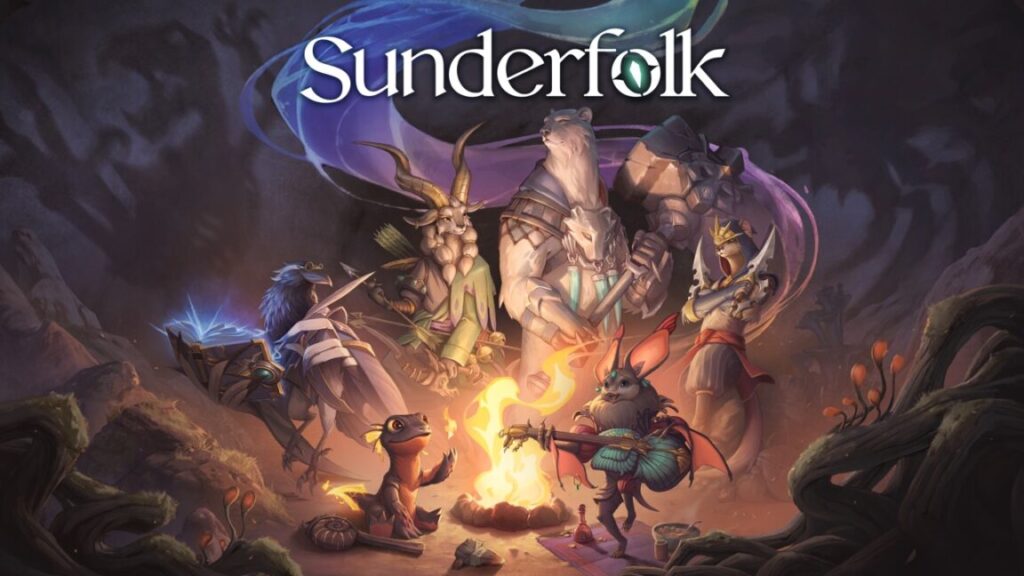
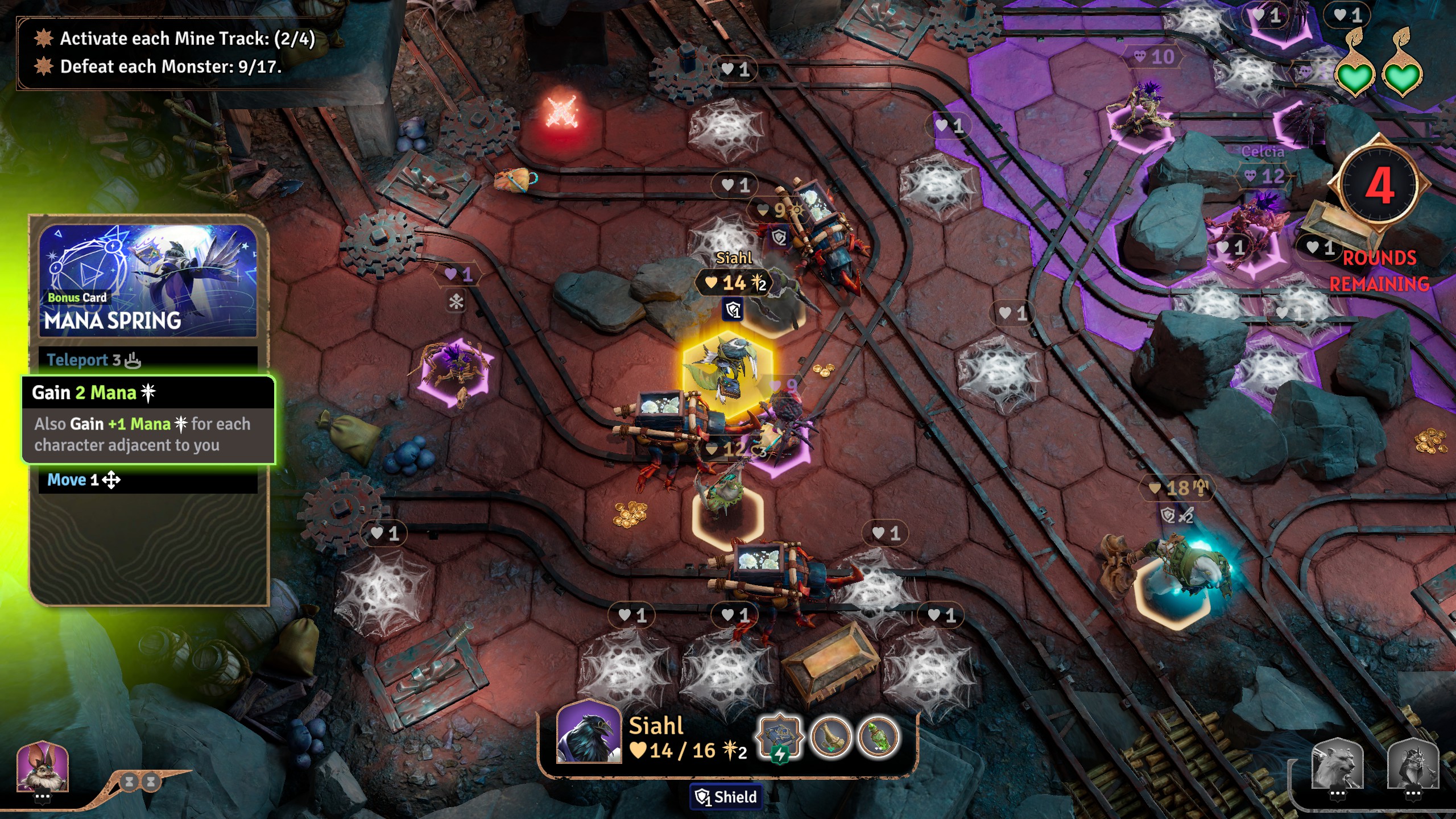
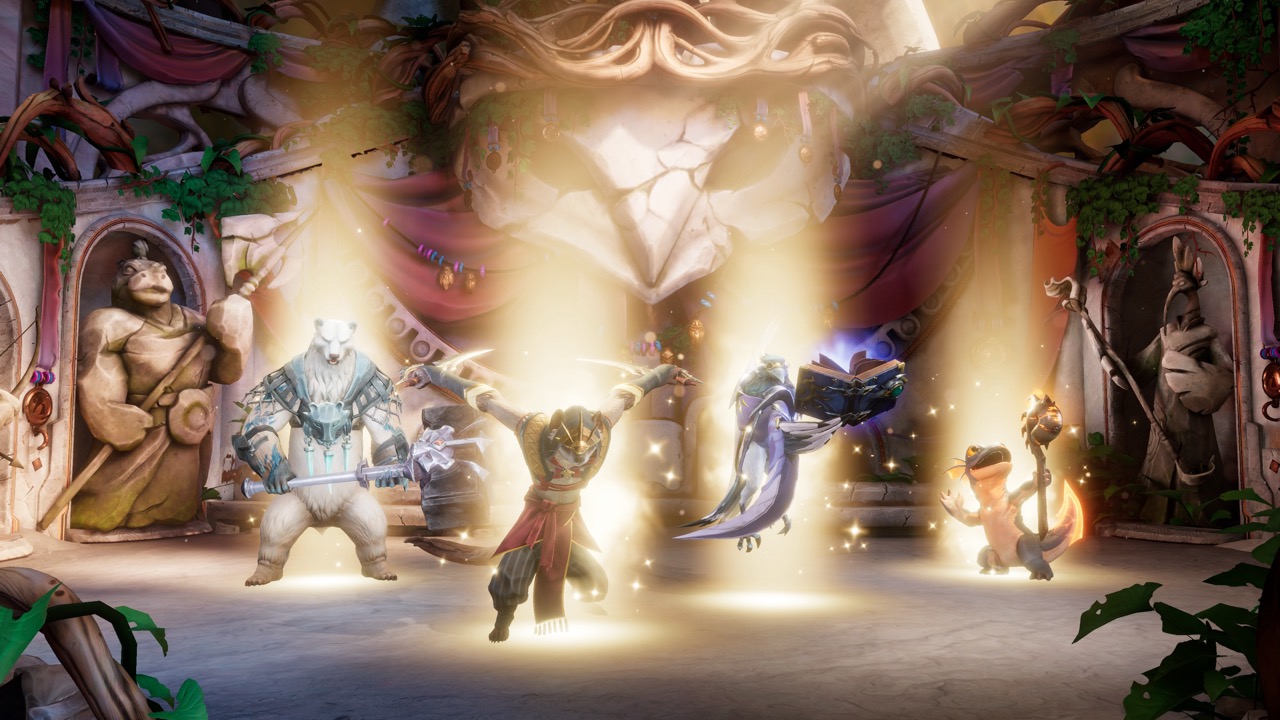
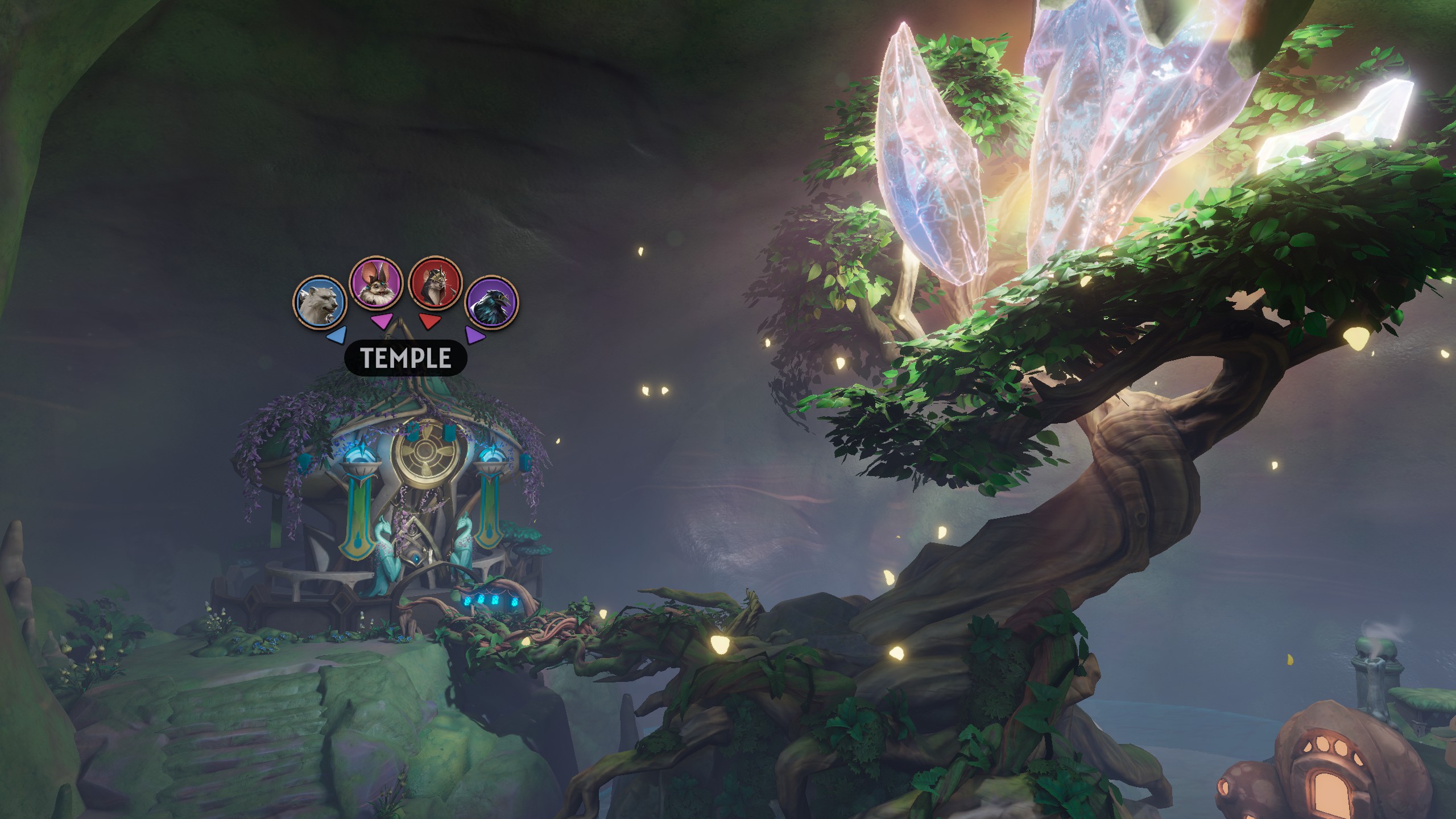
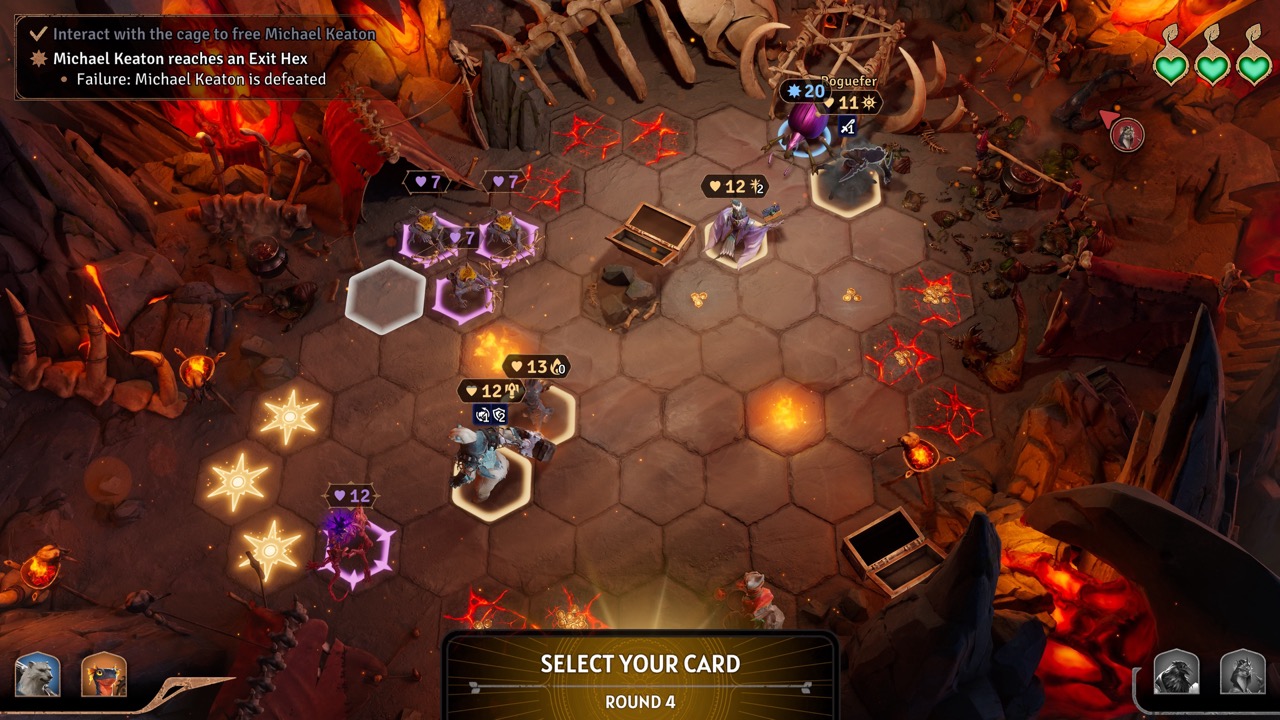
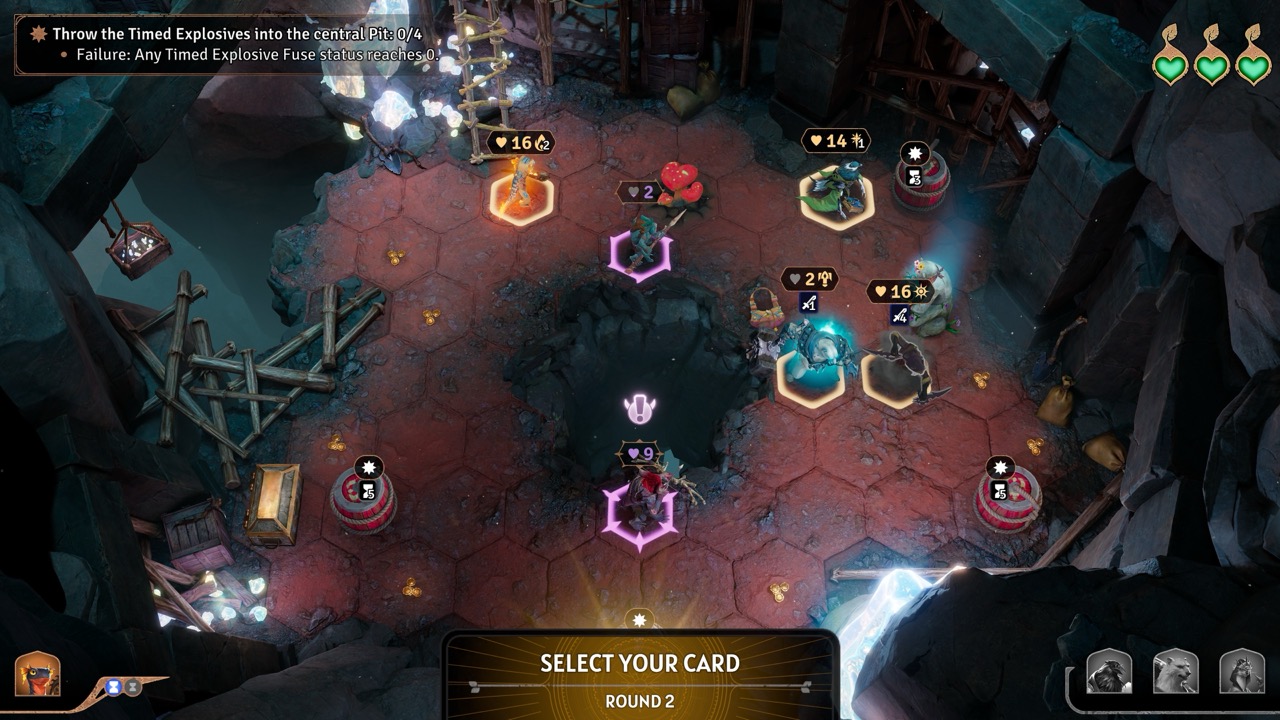

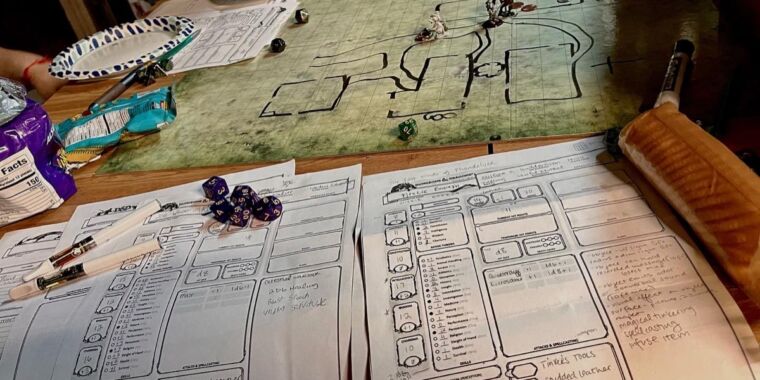
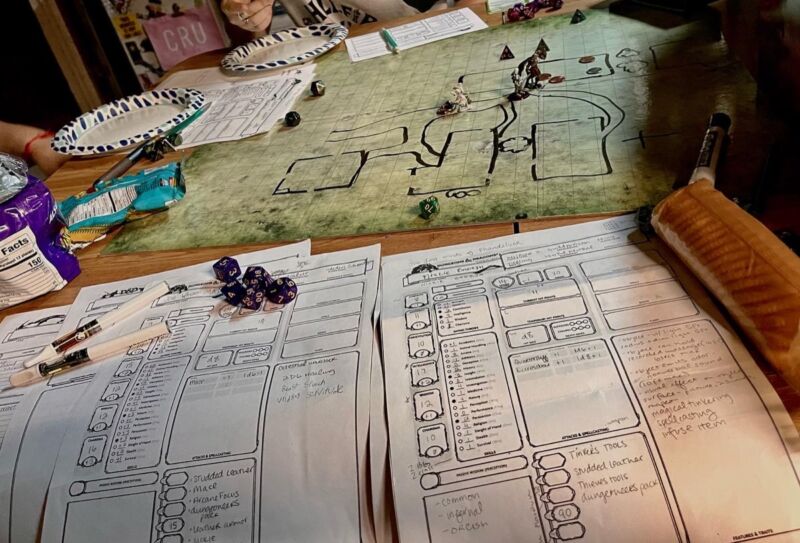
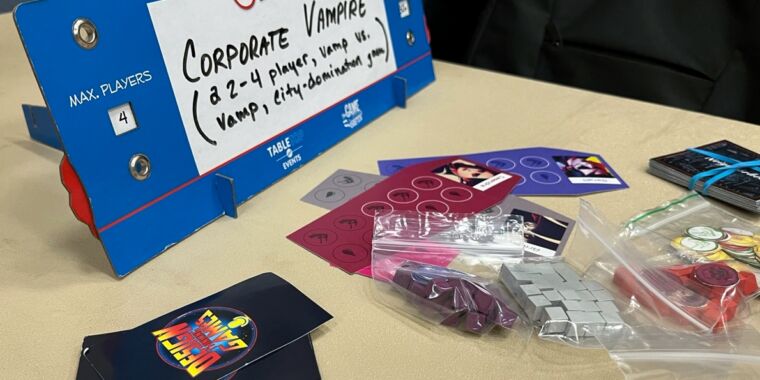
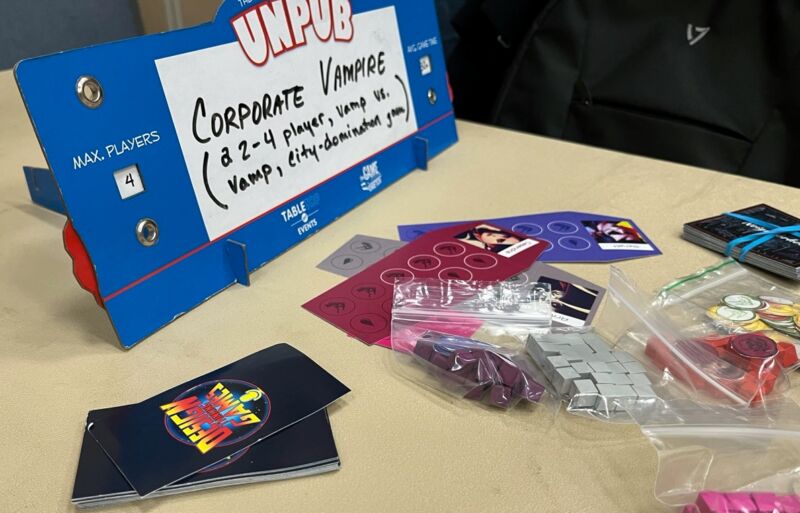
![Hand-cut tokens and make-do squares for an early version of <em>Thirst</em>.” height=”960″ src=”https://cdn.arstechnica.net/wp-content/uploads/2023/12/IMG_3964-Large.jpeg” width=”1280″></img><figcaption>
<p>Hand-cut tokens and make-do squares for an early version of <em>Thirst</em>.</p>
<p>Kevin Purdy</p>
</figcaption></figure>
<p>The way <i>CorpVamp</i>/<i>Thirst</i> should go is that each night, a vampire wakes up, loses a little blood, then sets out to get much more back by exploring a Victorian city. In populated neighborhoods, a vampire can feast on people—but doing so generates a board-altering Consequence, such as roving security guards or citizens discovering bodies. Vampires accumulate victims and hypnotize them for Influence, depending on who the victims are (“Judge” versus “Roustabout,” for example), turn them into “Baby Vampires,” or simply keep them as blood stock. You win by accruing victory points for various misdeeds and achievements.</p>
<p>One player, who told the designers that a different game’s play-test saw him “break the game in 10 minutes,” seemed bothered by how Consequences can be triggered by a single player’s actions but affect all players. Another has a hard time keeping track of the tokens for influence, movement, and blood, and when to move them on and off the board. That’s called “mess testing,” Schofield tells me, and he’s working on it. Some things will be easier to learn and use when the pieces have better designs and materials. But the <i>CorpVamp</i> team can’t jump to that stage until the mechanics are locked down.</p>
<p>As that group finishes a test, another group sits down immediately, having stood nearby to ensure their chance. Schofield and Broadwater won’t lack for players in their three-hour slot. That tells the team there’s “evidence of a market,” that their game has “stopping power” and “shelf value,” despite its obscurity, Schofield says. But there’s lots of work still to be done in alpha. “The costs of powers are too high, the powers aren’t <i>badass enough</i> [emphasis his], and the tactile movement of placing cubes and flipping tokens isn’t quite right,” he later tells me.</p>
<p>After more iterations and some “blind” play tests (players learning, playing, and finishing the game without creator guidance), the game will be in beta, and the team will get closer to pinning down the look and feel of the game with illustrators and designers. Since their schedules only afford them roughly three hours of dedicated collaboration time every week, they lean on what they’ve learned from their product-oriented day jobs. “Frequent iterations and small feedback loops will iron things out,” Schofield says. “Process wins.”</p>
<p>Then they can “enjoy the problems of production and distribution logistics.” After that, “We’ll sell copies of <i>Thirst</i> at the next PAX Unplugged.”</p>
<figure><img decoding=](https://cdn.arstechnica.net/wp-content/uploads/2023/12/who_knew-scaled.jpg)
